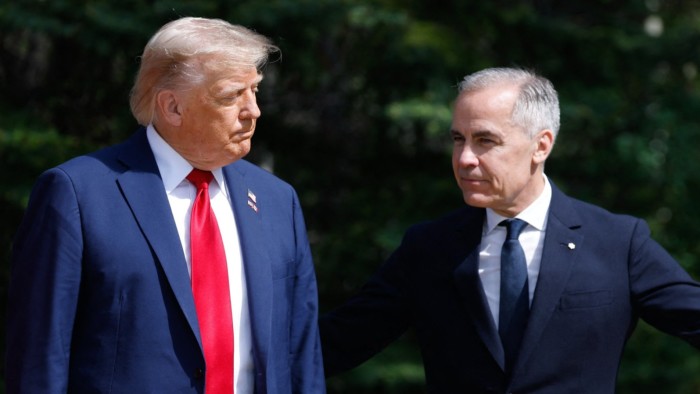Table of Contents
This article is an on-site version of our FirstFT newsletter. Subscribers can sign up to our Asia, Europe/Africa or Americas edition to get the newsletter delivered every weekday morning. Explore all of our newsletters here
Today’s agenda: UK’s F-35 jet fleet; Heathrow seeks rise in landing charges; WPP’s “Kodak moment”; and how Odesa’s Philharmonic Orchestra played on through the war
Good morning and welcome back to FirstFT. Donald Trump has said the US will impose a 35 per cent tariff on Canada at the start of August as he launches a fresh salvo against one of the country’s largest trading partners.
Why it matters: Steep tariffs on Canada would have wide-ranging economic consequences, including on many North American businesses that have heavily integrated supply chains with parts for finished products, such as cars, often crossing the border repeatedly.
Trade between the two countries reached more than $760bn last year, according to US customs data. Trump’s move also heaps pressure on Canadian Prime Minister Mark Carney, who won a federal election in April on the promise that he would stand up to the US president and use his experience as a central bank governor to steer his country through the economic turmoil unleashed by tariffs.
Market reaction: The Canadian dollar slid as much as 0.6 per cent against its US counterpart following the announcement, before paring losses to trade 0.3 per cent weaker. US stock index futures declined, with those tracking the blue-chip S&P 500 down 0.4 per cent, while futures for Canada’s benchmark shed 0.4 per cent.
Read more on the terms of the tariffs, including a “likely” exemption.
The return of ‘tariff man’: After a three-month pause, this week saw the revival of Trump’s global trade war.
Copper trade: Commodity firms could reap bumper profits of more than $300mn from metal shipped into the US ahead of new levies.
Opinion: Trump is sowing confusion in the markets, with American stocks at record highs despite the behaviour of bonds suggesting a downturn, writes Gillian Tett.
Here’s what else we’re keeping tabs on today and over the weekend:
Economic data: The UK releases May GDP estimates and France has CPI inflation rate data for June. The International Energy Agency publishes its Oil Market Report for July.
Companies: American pharmacy chain Walgreens Boots Alliance holds a special meeting of shareholders to vote on the proposed acquisition of the company by private equity group Sycamore Partners. DNB Bank and Norwegian Air report earnings.
Wimbledon tennis: Amanda Anisimova of the US faces off against Poland’s Iga Świątek in the women’s singles final on Saturday. The men’s final, which is still to be determined, takes place on Sunday.
How well did you keep up with the news this week? Take our quiz.
Join the FT’s books editors Frederick Studemann and Maria Crawford today at 1pm BST for a virtual Q&A to help you find the perfect summer books. Leave a comment here to receive expert recommendations.
Five more top stories
1. Chancellor Rachel Reeves will next week put the brakes on plans to reform cash ISAs, a British tax-free savings product, after a backlash from building societies and consumer champions. Reeves has not abandoned reform plans, but government officials admitted there were “differing views”.
2. Britain’s public spending watchdog has warned of “shortcomings” in the country’s F-35 fighter jet programme, saying “delays, lower-than-expected availability, infrastructure gaps and personnel shortages are undermining the armed forces’ warfighting capability”. Here’s the rest of the damning assessment.
3. Exclusive: Britain’s energy regulator is carrying out special monitoring of the National Grid. The quarterly reviews, which began before a substation fire in March led to the closure of Heathrow airport, are in relation to investment in its network of high-voltage cables, as the company faces questions over whether it is doing enough maintenance.
4. The US Department of State notified its staff that it would “in the coming days” fire hundreds of US-based employees, following the Supreme Court decision allowing Trump’s administration to proceed with mass job cuts across federal agencies. The department said it would target “functions” found redundant or out of sync with Trump’s agenda. Read the full report.
5. Exclusive: Google will heavily discount cloud computing services for the US government, as the Trump administration pressures technology groups to slash prices on long-standing, lucrative contracts. The agreement comes after Oracle last week cut a deal with the government, including a 75 per cent discount on some software contracts. Find out which other companies are expected to follow soon.
The Big Read
© FT montage/Getty
The Greek debt crisis in the 2010s led to the country almost exiting the Eurozone, but in the years since, Greece has staged a remarkable rebound, maintaining fiscal discipline and outgrowing richer economies. Ben Hall and Eleni Varvitsioti look at Greece’s recovery in the 10 years since the country faced near economic collapse.
We’re also reading . . .
Chart of the day
With heatwaves rapidly increasing in frequency around the world, the US-Europe difference in air conditioning use is becoming reflected in a startlingly wide disparity in heat-related deaths. John Burn-Murdoch thinks this former extravagance is becoming a necessity.
Take a break from the news
On February 12 2022, the Odesa Philharmonic Orchestra played its last concert before Putin’s full-scale invasion, with an encore that was “the most Ukrainian, patriotic thing you can get”. The overture to Mykola Lysenko’s opera Taras Bulba was met with a roar of applause as the audience rose to their feet. More than three years on, the orchestra’s chief conductor speaks with the FT about how they withstood Russian missiles to bring music to the city.
‘Ode to Invincibility’ charity concert at the Odesa Regional Philharmonic © Viacheslav Onyshchenko / SOPA Im/Sipa USA/Alamy

